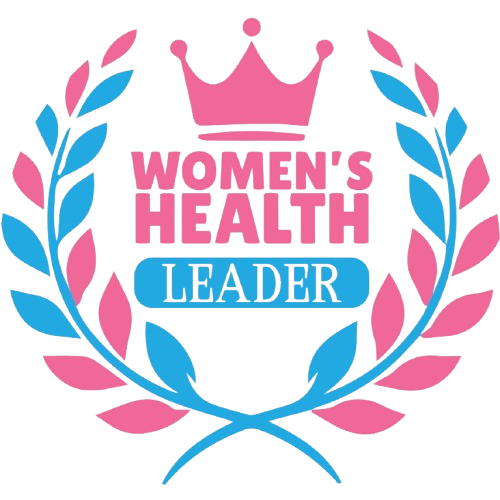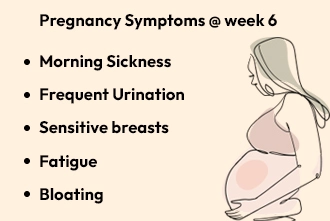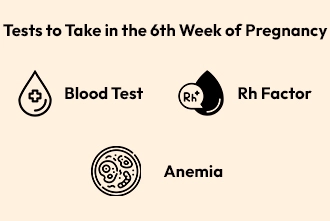
Dr. Aruna Ashok MBBS, MS OG, DNB OG
- Clinical Director


Congratulations! You've reached the 6th week of pregnancy. At this stage, your baby is growing rapidly and is about the size of a pea. Although tiny, significant developments are happening.
The heart, one of the first organs to develop, is starting to beat and pump blood. It may sound incredible, but by the end of this week, your baby’s heart will beat about 110 times per minute. Isn’t that amazing? This tiny beating heart is a powerful sign of the life growing inside you.
Alongside the heart, other organs are beginning to form. Your baby's brain, spinal cord, and other neural tissues are developing from the neural tube. The digestive system and lungs are also starting to take shape. Small buds, which will eventually become arms and legs, are starting to sprout. Your baby’s facial features, such as the eyes, ears, and mouth, are beginning to develop too.
As you think about these incredible changes, you might feel a mix of emotions—excitement, wonder, and perhaps a bit of anxiety. It's perfectly normal. Your body is creating life, and it’s doing an excellent job. Trust in the process and your body’s natural ability to nurture this new life.
Remember, every pregnancy is unique. The development might vary slightly from one woman to another. It’s crucial to stay positive and relaxed during this time. Each woman’s body responds differently to pregnancy, and what is normal for one person may not be the same for another. Embrace your journey and listen to your body’s needs.
Don't compare your experience to others, as this can lead to unnecessary stress. Engage in activities that promote relaxation and well-being, such as gentle exercise, meditation, and prenatal yoga. Trust in the process and maintain open communication with your healthcare provider for any concerns.
Have you heard about the birthing classes at A4 Fertility Centre? They provide a comprehensive guide to help you understand and enjoy every stage of your pregnancy. You’ll learn about fetal development, nutrition, and much more. It’s a great way to connect with other expecting mothers and gain confidence in your journey.


Welcome to week 6 of your pregnancy journey. This week, you might start experiencing several symptoms that indicate your body is working hard to support your growing baby.
Morning sickness, which can occur at any time of the day, is one of the most common symptoms. Nausea and vomiting are caused by the rapid increase in pregnancy hormones. While it can be uncomfortable, it’s usually a sign that your pregnancy is progressing well.
You might also notice breast tenderness and swelling. This is due to hormonal changes preparing your body for breastfeeding. Your nipples might become more sensitive, and the areolae could darken.
Fatigue is another common symptom you might experience during the 6th week of pregnancy. Your body is using a tremendous amount of energy to create a safe and nurturing environment for your growing baby. This energy is directed towards the rapid development of the placenta, which will provide nourishment to your baby throughout the pregnancy. As a result, you may find yourself feeling unusually tired or needing more sleep than usual. It's essential to listen to your body's signals and rest whenever you can. Take short naps if you feel the need, and ensure you are getting a good night's sleep.
Don't hesitate to ask for help with daily tasks or delegate responsibilities at work or home to conserve your energy. Maintaining a healthy diet and staying hydrated can also help manage fatigue. Remember, it’s okay to slow down and prioritize your well-being during this crucial time. Your body is performing an incredible task, and it deserves all the rest and care you can give it.
Frequent urination is caused by increased blood flow to your pelvic area and the growing uterus pressing on your bladder. It’s a good sign that your body is doing its job, but remember to stay hydrated.
Mood swings are also normal due to fluctuating hormones. You might feel happy one moment and teary the next. It’s okay to have mixed emotions.
Spotting and cramping might occur, but if you’re concerned, don’t hesitate to reach out to your healthcare provider. It's essential to monitor any changes and keep communication open.
A4 Fertility Centre’s birthing classes offer great support during this phase. They provide valuable information on managing symptoms and maintaining a healthy pregnancy. Plus, you’ll have a community of other mothers-to-be to share your experiences with.
Eating well during pregnancy is crucial for your health and your baby's development. At 6 weeks, focus on a balanced diet rich in essential nutrients.
Start with folic acid, which is vital for preventing neural tube defects. Green leafy vegetables, citrus fruits, and fortified cereals are great sources. Aim for at least 400 micrograms daily.
Protein is another essential nutrient. It supports the growth of your baby's tissues and organs. Include lean meats, poultry, fish, beans, and nuts in your diet. Aim for about 71 grams of protein each day.
Calcium is crucial for your baby's developing bones and teeth. Dairy products, like milk, cheese, and yogurt, are excellent sources. If you're lactose intolerant, try fortified plant-based milk or leafy greens like kale and broccoli.
Iron supports increased blood volume and prevents anemia. Red meat, poultry, fish, lentils, and spinach are iron-rich foods. Pair these with vitamin C-rich foods like oranges or strawberries to enhance absorption.
Don’t forget about omega-3 fatty acids, which are important for brain and eye development. Fatty fish like salmon, walnuts, and flaxseeds are good sources.
Hydration is key. Drink plenty of water to support your increased blood volume and amniotic fluid. Aim for about 8-10 glasses a day.
Limit caffeine and avoid alcohol. Too much caffeine can increase the risk of miscarriage, and alcohol can cause fetal alcohol syndrome. Opt for decaf beverages and enjoy a variety of hydrating options like herbal teas.
A4 Fertility Centre’s birthing classes can guide you through your nutritional needs and help you plan a healthy diet. They offer practical tips and personalized advice to ensure you and your baby get the nutrients you need.
Entering the 6th week of pregnancy is an exciting time, but it can also bring a lot of questions and concerns. This is where counseling can be incredibly beneficial.
Counseling provides a space to discuss your feelings and experiences. Pregnancy can bring about a range of emotions, from joy to anxiety. Talking with a professional can help you navigate these emotions and provide you with coping strategies.
One of the main topics in counseling during pregnancy is managing stress. High levels of stress can affect both you and your baby. Learn the relaxation techniques, such as deep breathing, meditation, and prenatal yoga. This can be very helpful.
Counseling also offers education about pregnancy and childbirth. Understanding what to expect can alleviate fears and make you feel more prepared. You can learn about the stages of pregnancy, fetal development, and the birthing process.
If you have a history of mental health issues, counseling can provide support to manage your condition during pregnancy. It’s important to maintain mental well-being for a healthy pregnancy.
Relationship counseling can also be beneficial. Pregnancy can change dynamics in a relationship. Open communication with your partner about expectations, roles, and concerns can strengthen your bond and prepare you both for parenthood.
A4 Fertility Centre’s birthing classes offer counseling as part of their program. They provide sessions with experienced professionals who can address your concerns and guide you through this journey. Being part of these classes also connects you with other pregnant women, creating a support network.
During the 6th week of pregnancy, several tests are recommended to ensure both your health and your baby's well-being.
A blood test is often one of the first tests done. It checks for your hCG (human chorionic gonadotropin) levels to confirm the pregnancy and ensure it’s progressing normally. It also checks your blood type, Rh factor, and screens for anemia and other conditions.
An early ultrasound may be performed around this time. It helps confirm the pregnancy’s location in the uterus and checks for the baby’s heartbeat. Seeing that tiny flicker on the screen can be a magical moment.
Your healthcare provider might also recommend a transvaginal ultrasound. This provides a clearer image of your developing baby and ensures everything is progressing as it should.
Screening for infections is crucial. Tests for urinary tract infections, sexually transmitted infections, and other infections are commonly done. Treating any infections early ensures a healthier pregnancy.
A thyroid function test might be conducted to ensure your thyroid levels are within the normal range. Proper thyroid function is essential for your baby’s brain development.
If you have a history of medical conditions, additional tests might be necessary. These could include tests for diabetes, high blood pressure, or autoimmune disorders. Your doctor will guide you better based on your medical history.
Genetic screening might also be recommended if there are risk factors. This can include tests like chorionic villus sampling (CVS) later in the first trimester, providing important information about your baby’s health.
All these tests might sound overwhelming, but they are crucial for monitoring your and your baby's health. They provide valuable information to ensure a healthy pregnancy journey.
A4 Fertility Centre’s birthing classes cover the importance of these tests and what to expect during each one. They offer a detailed explanation, so you feel informed and confident. You’ll also meet other expectant mothers, sharing your experiences and gaining support from one another.